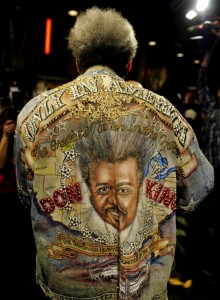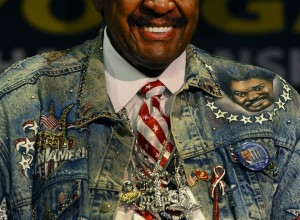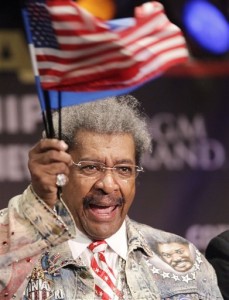Dan Wetzel from ThePostGame.com posted an awesome article on Don King, here are some highlights, the greatest salesman in the sport. Don King has killed two men, one with his bare hands. He’s served time in prison, been sued, condemned and criticized. He’s been called the epitome of an American con man. He’s also been hailed as the embodiment of the American Dream, and not just by himself. He’s promoted over 600 championship fights, made millions for many and raised countless piles of cash for charity.

A salesman is a salesman and they don’t come better than Don King, the old “numbers brother” from the east side of Cleveland, who’s been able to maintain his old cut-throat gangster instincts while selling the world on a loveable, huggable persona so harmless younger women still swoon. Whatever he’s done wrong, the public has apparently forgiven. Or forgotten.
King is undeterred. He believes he can sell this fight, because he’s always been able to sell people things. There are bootstrap tales and then there is Don King, up from poverty and through a life of crime onto the other side of untold glory and riches and indictments. He’s killed and had people attempt to kill him.
Don King was going to be a lawyer, no small dream for a black kid from Cleveland’s John Adams High School in 1949. He was set to attend Kent State as one of its few African American students.
To pay for it, King spent the summer working with his brother as a numbers runner. There were no state lotteries then so people would bet with local bookies. The “drawing” was determined by the last digit of the closing of three New York stock exchange charts printed in the newspaper.
Even as an 18-year-old, would-be college student, King was a prodigious earner, talking everyone in his territory to bet more and more. He was relentless. Then one day he lost a woman’s betting slip — it wound up stuck to the bottom of a flower pot. Her number came in. His boss said since it was King’s mistake, he was on the hook for the payout. There went the tuition. There went college. King became a full-time numbers man.
Within a year, he was in charge. He was a natural, folks flocking to him. Just like now, it’s all about connecting with people, creating the perception of entertainment, making them think he’s in on something they aren’t. When someone’s number hit, King would stuff the cash into a bag and take it to a bar where he’d pay out in front of everyone.
It was a brutal racket, of course, something that suited King just fine. Standing just over 6-feet tall, King was often seen with a huge cigar in his mouth and a .38 tucked under his belt. On the street he was known as Donald “The Kid” King.
His reputation as a man not to be messed with was enhanced in 1954 when he shot and killed a guy named Hillary Brown. Since Brown, at the time, was trying to rob one of King’s gambling operations (an illegal gambling operation, but still), it was ruled “justifiable homicide.” King went free.

At its apex, King’s operation was said to be grossing $15,000 a day. That attracted the attention of, among others, a man named Alex “Shondor” Birns, a notorious local mobster whose career stretched from Prohibition to his death in 1975, when his Cadillac was bombed so violently that his body was blasted through the roof and wound up in pieces all over a church fence. Birns was 68 years old when someone needed him to be
that dead.
The mob demanded protection and insurance money, and King was willing to go along with the deal if they would offer short-term loans in case of a major loss. King said they agreed. Then when he needed a loan one day, he was refused.
“They said, ‘No, we ain’t going to loan you anything.’ I said, ‘I’ve been paying in all this time, what’s the redeeming value?’ ‘Ha, ha, ha,’ they laughed. I was willing to go along with any program but once the program was violated I said, ‘(Expletive), I ain’t paying this no more.’
“Then my house got blown up and I got shot in the head.”
King survived both the bombing and later the ambush in his driveway, although he still sports several bullet pellets in the back of his skull.
King held off the wise guys and his power grew. He was both beloved and feared. Then came 1966 when an employee, Sam Garrett, “ran off with (some) money,” according to King.

King hunted Garrett down at a local bar, dragged him outside and proceeded to engage in what police charged was a hellacious battle. Garrett wound up dead, his head smashed against the sidewalk.
King wound up having his charge reduced to manslaughter (a sweetheart deal) and was shipped to the Marion Correctional Institute for just four years.
For King, it was enough. He was done with running numbers. He said he was profoundly remorseful of the death. He vowed to change. “I didn’t serve time, I made time serve me.” He hooked up with the prison priest and started reading. His first book was “Meditations” by Marcus Aurelius, a Roman emperor and philosopher who believed in duty and service. It’s no light fare. King went from there.
He got out in 1970 and opened a night club, the Corner Tavern in Cleveland. There he met Muhammad Ali, who was exiled from boxing after refusing to report to the military. The two hit it off and in 1972 King promoted an Ali exhibition fight to benefit a local black hospital. It sold out Cleveland Arena and raised an astounding $80,000.
That was his foray into boxing — promoting The Greatest.
You can read the full story here.


i whant donking to be mey promotor
Comments are closed.